Could Florida's war on voting change the outcome of 2012?

It's a well-documented story: Bolstered by new-found control or increased majorities, Republican state legislators pushed a bevy of laws that place new restrictions on voting. Bills requiring voters to show photo ID at the polls got the most attention, but the onslaught included measures to cut early voting days and erect new barriers to voter registration and turnout drives.
Not all of the bills passed, and the precise impact on voting turnout is impossible to predict. Last week, the Brennan Center, a nonprofit advocacy group, made the first attempt to quantify the potential fallout in a 58-page report detailing the new laws and how many voters could be affected.
Their estimate: Up to 5 million eligible voters may face new obstacles to voting. What's more, many of the states that have passed the most stringent changes, like Florida, are likely to be big battlegrounds in 2012.
The impact of the new laws is especially important in the South, where the region's rapidly changing demographics appear to be favoring Democrats, but where voter restrictions will likely benefit Republicans.
Florida is the clearest example. In 2008, the growing "New Majority" of African-American, Latino and progressive white voters -- especially youth -- were critical to Obama's victory in 2008. The share of non-white voters alone rose from 24 percent of Florida's electorate in 2004 to 29 percent in 2008.
The 2010 Census revealed that the demographics continue to work in Democrats' favor: Latino voters now make up more than 19 percent of the voting-eligible population. 41 percent of Florida voters are Democrats, compared to 36 percent Republican.
Yet despite these demographic favorables, Florida remains a tight battleground where changing the voting rules could also change the results. Even with the Democratic upsurge in 2008, Obama still won Florida by only just under 205,000 votes. That's well within the scope of voters who will likely be affected by the dramatic voting changes enacted by the state's Republican majority in 2011, which included:
* A shortening of the state's early voting period from 14 days to eight. 4.3 million Florida citizens used early voting in 2008 -- more than 45 percent of them Democrats, compared to just 37 percent Republican.
* A new restriction on voter registration drives which reduces the number of days that a registration form has to be turned in from 10 days to two. If forms are turned in late, the groups responsible face steep fines and penalties -- which caused the venerable League of Women Voters to abandon their voter registration drives in the state. The Brennan Center shows why Democrats will be disproportionately affected:
For instance, Florida’s new law—which places so many new burdens on voter registration drive activity that most groups have discontinued their voter registration activities in the state—will almost certainly hit African American and Hispanic voters hardest. In Florida, U.S. Census Bureau data from the 2004 and 2008 election cycles show that both African-Americans and Hispanics rely more heavily than white voters on community-based voter registration drives; in fact, African-American and Hispanic citizens in Florida are more than twice as likely to register to vote through such drives as white voters.
* Eliminating Sunday as an early voting day -- a measure squarely aimed at "Souls to the Polls" turnout campaigns used by African-American, and to a lesser extent Latino, churches. As the Brennan Center notes:
[I]n the 2008 general election in Florida, 33.2% of those who voted early on the last Sunday before election day were black and 23.6% were Hispanic, whereas blacks constituted 13.4% of all early voters statewide (for all early voting days) and Hispanics constituted 11.6%.
* New restrictions on ex-felon voting: For years, Florida had one of the most restrictive bans on ex-felon voting in the country, which in 2000 led to 600,000 citizens -- disproportionately African-American and Democratic voters -- being kept from voting. Republican Gov. Christie eased clemency laws in 2007, making it easier for tens of thousands of ex-felons who had paid their debt to society to be brought back onto the voting rolls.
But in March 2011, GOP Gov. Rick Scott signed a bill that placed a host of new restrictions on ex-felon voting, including a five-year delay on restoring ex-felon voting rights -- a move that the Brennan Center warns could impact hundreds of thousands of Florida voters.
Put all of the new Florida voting laws together, and could they affect enough voters to make a difference in Florida with its 29 Electoral College votes? Some have criticized the Brennan Center's findings, saying the 5 million figure represents a high-case scenario (although that mostly has to do with voter photo ID and citizenship requirements, which weren't part of the 2011 changes in Florida).
But in a state like Florida -- where victories entail the closest of margins and where Obama is currently neck-and-neck with GOP front-runner Mitt Romney in the polls -- the potential impact is clear.
Indeed, in such a 2012 battleground, the war on voting could make all the difference.
Tags
Chris Kromm
Chris Kromm is executive director of the Institute for Southern Studies and publisher of the Institute's online magazine, Facing South.
